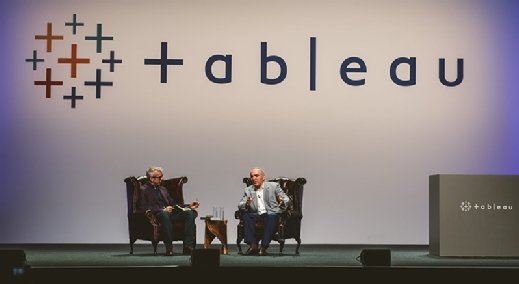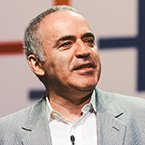
Mahi - stock.adobe.com
Chess grandmaster Garry Kasparov tells Tableau users human intelligence still has role to play
Garry Kasparov, a former world chess champion, tells Tableau’s European conference that artificial intelligence is a positive force that will stoke, not choke, human creativity
Former world chess champion Garry Kasparov told delegates at data visualisation software supplier Tableau’s 2018 European user conference in London that they still have a role to play in the era of artificial intelligence (AI).
“There is a thick fog of mythology surrounding AI,” he said. “It is like a medieval religious debate, with a small group preaching that it consolidates the solving of the world’s problems, and a much larger group of doomsayers saying it is the end of humanity, the end of the world. I like to bring it down to earth.”
Kasparov takes particular comfort, he told the audience, from a quote by Cornell University mathematician Madeleine Udell that “only a human can determine if [a] problem is defined well”.
The general thrust of his keynote speech, which turned on his 2017 book, Deep Thinking, was that humans are not being replaced by artificial intelligence, but are rather being promoted. And that any losses for individuals are outweighed by “a collective win” as any automated discipline gets better – radiology being a prime example. AI might be bad, in respect of its strength in image recognition, for radiologists, but it is good for radiology, and therefore for patients.
Kasparov speaks with particular authority on these matters because he was, as the reigning world chess champion, famously beaten by IBM’s Deep Blue computer in 1997, over (a second series of) six games. The computer made fewer mistakes in the games it won, which is the essential, ever-increasing advantage machines have over humans in chess, and similar games. Kasparov joked that his big mistake when playing IBM’s machine in 1996 and 1997 was not to ask for stock options – IBM’s stock got a short-term boost from Deep Blue’s victory.
The scalp of the world chess champion had, he recounted, become a “holy grail” for computer scientists – from Alan Turing, who was himself a fine player, onwards. And Kasparov became the champion scalped.
Kasparov adverted to the great minds of computer science, pre-eminently Turing, who believed that when a machine could beat a human at chess, that would be “the dawn of artificial intelligence”.

“But they over-estimated what machines could do in the short run, and under-estimated what they could do in the long run,” he said. “They also thought for machines to prevail in chess, machines would have to be perfect. And, in truth, they just have to be better by making fewer mistakes.”
Kasparov’s matches against Deep Blue were, at the time, hailed as “the brain’s last stand” on the cover of Newsweek. “So, no pressure,” he joked.
Machines no match for human intelligence
Kasparov was unhappy at losing, but took comfort, too. “Deep Blue was still a number-crunching machine, [assessing] 200 million positions per second, but it couldn’t unlock the secrets of human intelligence,” he said.
The march of the machines in games like chess has been impressive. Elo ratings are the conventional way to measure the strength of chess players. Each player has a number, which goes up or down depending on the outcomes of games between rated players.
In chess, there has been a gradual improvement in humans, according to the Elo ratings. Bobby Fischer, the US world champion, was rated 2785 in 1972 at his peak. Kasparov was, at peak, 2851. Magnus Carlsen, the Norwegian current world champion, is currently at 2842.
“There has been a steady, but slow, drive upwards. But the strongest chess [software] engines today – Stockfish, Komodo – are in the 3100-plus category, so much stronger that competition even with Magnus Carlsen would make no sense. Not because they understand chess, but because they make almost no mistakes,” he told the audience.
Kasparov went on to talk about how Google DeepMind’s AlphaZero goes well beyond the data crunching capabilities of Deep Blue. Demis Hassabis, the founder and CEO of DeepMind, was, as is well known, a strong chess player himself, and his company’s AlphaGo vanquished Lee Sedol, one of the world’s best players of Go, a Chinese strategy game with many more move possibilities than chess, in 2015.

“When a machine makes a decision, it uses computation to go all the way down. Choice is human because to make the right choice we have to understand what matters and why”
Garry Kasparov, chess grandmaster
The number of positions possible in Go make a traditional brute-force approach, as was used with IBM’s Deep Blue to defeat Kasparov in chess, impossible, at least with today’s computers. And so, DeepMind applied a machine learning approach.
According to TechTarget’s WhatIs site, “AlphaGo Master, the version that beat the world champion Go player Ke Jie, uses supervised learning. AlphaGo Zero, the unsupervised learning version of AlphaGo, learns by playing against itself”.
Interviewed onstage by Tableau’s technical evangelism director, Andy Cotgreave, Kasparov told the audience that even he had learned from AlphaZero, when applied to chess. For example, that bishops have a higher value than knights. These pieces are usually seen as equivalent, which is what learners have been taught over the centuries, but AlphaZero’s “chess from another dimension”, as described by Hassabis, has no regard for human received wisdom in chess. It certainly plays a lot of chess. Kasparov related how in four-and-a-half hours, AlphaZero played 60 million games against itself, starting from scratch. It played Stockfish “and crushed it”.
“It is clear that this has opened a new page in the history of AI, because for the first time, computers are producing their own knowledge,” he said.
However, ultimately, Kasparov said humans make choices, while machines can only make decisions.
“It sounds like a semantic difference, but it separates two worlds apart. When a machine makes a decision, it uses computation to go all the way down. Choice is human because to make the right choice we have to understand what matters and why it does: as individuals, as companies, as societies. We have to choose whether to be aggressive and take risks, or not. We have to choose to look at the next big thing, or not. If we envision a bright future, we can do more, we can invest more. And we can dream. That is the one thing that only humans can do,” he said.
Read more about artificial intelligence and mind games
- What is AlphaGo?
- Computer AI has been the holy grail of application development for nearly 50 years, but just because some projects now claim to use AI, that doesn’t mean they do.
- Pitting a chess computer against a chess champion used to be the end goal for machine intelligence. We explore how game play has improved artificial intelligence.











